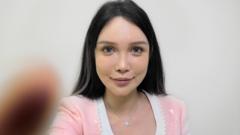In recent years, social media has turned into a breeding ground for unverified health advice, particularly concerning polycystic ovary syndrome (PCOS). Sophie, a 12-year sufferer of the condition who faced difficult symptoms like painful periods and weight gain, fell victim to this trend. In her quest for relief, she discovered Kourtney Simmang on Instagram, who touted a comprehensive “health protocol” and unproven lab tests aimed at treating the “root cause” of PCOS—an aspect of the condition that researchers have yet to identify.
Despite her skepticism, Sophie invested nearly $3,600 (£2,800) into Kourtney’s program, including excessive spending on affiliate-linked supplements. After a year without improvement, she felt even worse about her health. Dr. Jen Gunter, a gynaecologist and expert in women's health, cautioned against the reliability of these influencers, highlighting that they often lack the qualifications necessary to endorse the tests and treatments they promote.
A significant issue arises from the high number of unqualified influencers with large followings asserting themselves as “experts.” Research from the BBC World Service found that half of PCOS-related videos on TikTok and Instagram disseminate misleading information. High-profile influencers share false claims, such as the idea that PCOS can be cured solely with dietary supplements or particular diets, including restrictive options like the keto diet.
The World Health Organization estimates that up to 70% of women with PCOS remain undiagnosed, exacerbating their vulnerability to dubious health trends. According to Dr. Gunter, during such gaps in verified medical treatments, many fall prey to profiteers selling deceptive solutions. Their common misconceptions include the notion that pharmaceutical interventions, like birth control pills, worsen PCOS symptoms, despite evidence supporting their therapeutic use.
Responses from social media platforms reveal varying approaches to health information regulation. TikTok stated it prohibits harmful misinformation, while Meta permits user-generated content around women's health without strict restrictions.
Influencers like registered dietitian Tallene Hacatoryan, with over two million followers, promote expensive supplements and programs, while warning against effective medical solutions. This trend leads many women, like Amy from Northern Ireland, to struggle with self-doubt in their health journey. Even after seeking medical advice, they often feel pressured to conform to these influencers’ unrealistic standards.
As advocate Medlyn from Nigeria highlights, PCOS comes with stigma and feelings of inadequacy. In a world where many are misled, she emphasizes the importance of evidence-based treatment and consulting healthcare professionals. Dr. Gunter advises women experiencing symptoms to seek specialist care if their general practitioner is unable to offer effective solutions.
For many like Sophie, the search for credible treatments continues amidst a landscape filled with dubious claims and emotional turmoil. As the conversation evolves, both patients and healthcare providers must emphasize the need for factual information and the empowerment of women navigating PCOS.
Despite her skepticism, Sophie invested nearly $3,600 (£2,800) into Kourtney’s program, including excessive spending on affiliate-linked supplements. After a year without improvement, she felt even worse about her health. Dr. Jen Gunter, a gynaecologist and expert in women's health, cautioned against the reliability of these influencers, highlighting that they often lack the qualifications necessary to endorse the tests and treatments they promote.
A significant issue arises from the high number of unqualified influencers with large followings asserting themselves as “experts.” Research from the BBC World Service found that half of PCOS-related videos on TikTok and Instagram disseminate misleading information. High-profile influencers share false claims, such as the idea that PCOS can be cured solely with dietary supplements or particular diets, including restrictive options like the keto diet.
The World Health Organization estimates that up to 70% of women with PCOS remain undiagnosed, exacerbating their vulnerability to dubious health trends. According to Dr. Gunter, during such gaps in verified medical treatments, many fall prey to profiteers selling deceptive solutions. Their common misconceptions include the notion that pharmaceutical interventions, like birth control pills, worsen PCOS symptoms, despite evidence supporting their therapeutic use.
Responses from social media platforms reveal varying approaches to health information regulation. TikTok stated it prohibits harmful misinformation, while Meta permits user-generated content around women's health without strict restrictions.
Influencers like registered dietitian Tallene Hacatoryan, with over two million followers, promote expensive supplements and programs, while warning against effective medical solutions. This trend leads many women, like Amy from Northern Ireland, to struggle with self-doubt in their health journey. Even after seeking medical advice, they often feel pressured to conform to these influencers’ unrealistic standards.
As advocate Medlyn from Nigeria highlights, PCOS comes with stigma and feelings of inadequacy. In a world where many are misled, she emphasizes the importance of evidence-based treatment and consulting healthcare professionals. Dr. Gunter advises women experiencing symptoms to seek specialist care if their general practitioner is unable to offer effective solutions.
For many like Sophie, the search for credible treatments continues amidst a landscape filled with dubious claims and emotional turmoil. As the conversation evolves, both patients and healthcare providers must emphasize the need for factual information and the empowerment of women navigating PCOS.





















